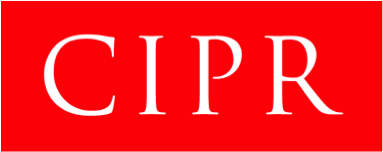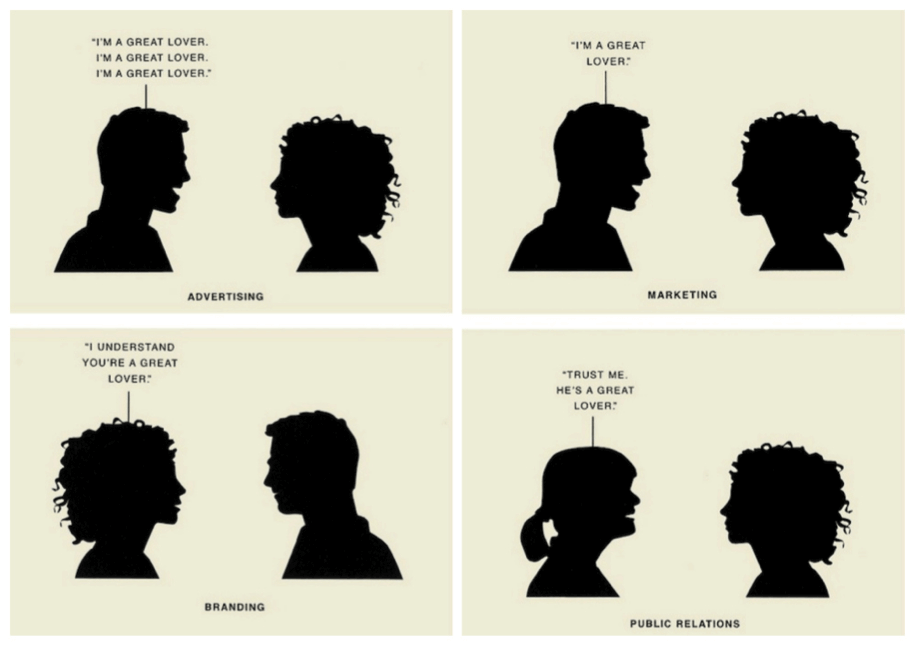You know what bothers me?
Articles that tell people they should – definitely, absolutely, no-doubts-about-it – rely on PR to support their SEO strategy.
You know why it bothers me?
Because it’s like recommending someone to use a spoon for whisking eggs.
Will the spoon get you there at some point?
Sure.
Is it the most efficient way to whisk eggs?
Of course not.
All this to say that PR and link building have different objectives.
They are two different practices that every now and again can collide, and more often than not could work collaboratively.
Yet, there’s more and more articles coming out every day about how PR is the new link building:
But let’s start with the basics, shall we?
What Is Public Relations?
“Public Relations is about reputation – the result of what you do, what you say and what others say about you.
It is the planned and sustained effort to establish and maintain goodwill and mutual understanding between an organisation and its publics.”
So basically, PR is the discipline that looks after the reputation, controls the conversation and is the main point of contact with the press about a company.
How do they do this?
By defining a positive message and managing the relationships with the media, who in turn will help them distribute their message through editorial coverage.
They don’t pay journalists to write stories. Their actions are not focused on generating sales. They don’t get involved in advertising.
Among other techniques, they distribute company news through press releases. They write pitches about their client and send them to reporters. The organise events designed to reach their intended audience.
Could all this lead to links? Possibly.
Can you support your SEO strategy with the possibility of earning links? Not really.
What Is Link Building?
“Link building is the process of acquiring hyperlinks from other websites to your own.
There are many techniques for building links, and while they vary in difficulty, SEOs tend to agree that link building is one of the hardest parts of their jobs.”
— Moz
Simply put, link building is an SEO practice that has one goal and one goal only: getting external pages to link to a page on your website.
How do they do this?
By identifying existing linkable assets on their website and creating new ones, so they can pitch them to online publishers and sites who will find them valuable enough to link back.
They don’t control the sites that link back to their website. They don’t normally get involved in the technical elements of SEO. Their actions are not focused on driving direct sales.
Among other techniques, they find broken links on target sites and offer new alternatives to webmasters so they can replace them. They contribute to crowdsourced posts and resource pages that will allow them to add a link back to their site. They host webinars, create white papers and launch new content to attract links.
The Case Against Gambling With PR
When Clayburn Griffin wrote his infamous article for Search Engine Land stating that “technical SEO is nothing but makeup,” the entire SEO community went to war, outraged by his claims.
I didn’t go to war.
But there was one bit of advice he gave in that article that drove me insane:
You know what, Clayburn? That’s some terrible advice right there.
‘How dare you?’ You ask. ‘PR done right is effective. Check out this case study on how XYZ got press coverage and built links by launching a tool/hosting an event/announcing a new initiative by the brand.’
And all that is absolutely fair.
I’m sure there are plenty of PR campaigns that drive links, the same way that there are plenty of advertising campaigns that drive links.
But recommending good old-fashioned PR to someone who is looking to increase the search visibility of a website in order to drive organic traffic is nuts.
“If you need links—which you do if organic traffic is important to your site—you need to pursue a strategy that is link intensive.”
The goal of a public relations campaign is NOT to build links. So PR is not link intensive.
Whereas link building is a sustainable, repeatable technique that can support the search visibility of a website.
What is more, PR is generally expensive and when you’re on a tight budget, you shouldn’t start by dropping 80% of everything you’ve got in a technique that is meant for a different purpose.
Why Are We Trying To Get Rid Of Link Building?
A few years ago I wrote a post stating that we were missing the point and, unfortunately, I think that we’re still missing the point.
We’re trying to rebrand one of the core elements of SEO and throwing all of our learnings away by jumping into a new bandwagon – even if that means not helping our clients grow their business in the most effective way.
PR is a basic need for big brands but it shouldn’t be a strategy for links.
The value link building brings to the table is based on the inherent knowledge of how SEO works and the many years of testing and trying new things.
I totally get that link building became a dirty word after Google rolled out Penguin.
However, editorially provided backlinks are still the most important factor when increasing search visibility.
In 2016, link building is really hard and it will only get harder with time. That’s why we put a lot of effort into creating content that is worth linking out to and into improving the way we approach our targets with our pitch.
“PRs can build great links, but they can also do a fantastic job at not building links… What they often miss is the fullness of the opportunity. Perhaps an analogue mindset to what’s more often a digital problem.
Link builders, however, are most often good at building links, but can struggle with building links that matter, those which stand out and give them the edge. ”
Wrapping It Up
As a person who’s been building links since 2009 and who has worked with PR professionals on many campaigns, I know for fact that we think differently.
Being different doesn’t make one of us better than the other. We both bring value in our own way.
PRs can set out to build links in the same way link builders can start pitching to journalists – it’s not an either/or.
Should link builders launch link reclamation campaigns after PRs have finished their job? Definitely.
Could you incorporate PR techniques into your link building? Of course, and this approach has led to a rise in popularity for services like digital PR.
But let’s not confuse things here, people.
Give link building some respect.
But what do you think about all this? You’ll find me on @ichbinGisele.
Image Sources: Laura Bittner / Kadir Özp?nar / David Meurin








You miss the point. When I say do some good ol’ fashioned PR, I mean that’s going to get you better links than “link building” will. An SEO shouldn’t be trying to get links, ever. They should be aligning with activities that do get links naturally, such as PR and content marketing. If you’re building links for SEO’s sake, you’re doing it wrong. Google says as much. If the link is only about SEO, it won’t help much, but if you can do PR because you should be doing PR in the first place and align your SEO strategy with it, you can get good links because good links come from PR naturally, but these links will also be relevant to your SEO strategy because of that alignment.
I think you’re just getting picky over semantics. So maybe we’re saying the same thing.
‘When I say do some good ol’ fashioned PR, I mean that’s going to get you better links than “link building” will.’
– What is this mysterious “link building” you’re talking about?
‘An SEO shouldn’t be trying to get links, ever. They should be aligning with activities that do get links naturally, such as PR and content marketing. If the link is only about SEO, it won’t help much, but if you can do PR because you should be doing PR in the first place and align your SEO strategy with it, you can get good links because good links come from PR naturally, but these links will also be relevant to your SEO strategy because of that alignment.’
– So you claim an SEO shouldn’t try to get links, but then you say that the best way to get GOOD links is by working with PR and content marketing… Which one is it? Don’t build links? Or build links but only from high authority media outlets?
If you do good work and share it with people, you will get links. Whether that’s content marketing, PR, advertising or SEO. Links is a way in which journalists credit content and readers share content.
‘I think you’re just getting picky over semantics. So maybe we’re saying the same thing.’
– I don’t think so.
I’m a link builder and I’ve been a link builder for many years now. Throughout that time, I experienced the shift from link building to inbound marketing to content marketing to, now, PR as a way of, as you said, ‘getting links that are relevant to your SEO strategy.’
Meanwhile, I’ve been getting my clients featured on the same high authority media outlets that you say only PRs can get — you know, the ones that are outside my jurisdiction. And I’m not alone, plenty of other people came from the world of SEO and spent a lot of time getting good at building great links.
But now, you come here to tell me that what I do (the content I create and promote and get links to) is not my job, that it’s someone else’s job.
So no, this is not about semantics.
Framing this as an either/or decision isn’t good advice either. PR can earn high-quality links and it absolutely is *a* goal, among many, of the modern and digitally savvy PR pro. AND that doesn’t replace good SEO work either. Businesses need both and these functions work better when they work together.
Hi Frank! Thanks for reading and commenting. I actually didn’t advice to see it as an either/or – but as two different practices that can be overlapped. So I think we’re on the same page!
The problem, as always, isn’t the practice, it’s the practice defined (or bastardised) by the SEO community. I’ve seen a million articles over the years declaring ‘X is the new Y’, ‘Y is dead’ or that next year is ‘the year of Z’. And these ridiculous absolutes are always nonsense.
For decades PR agencies have built a set of skills that SEO teams – having never needed them before – are now desperate (but not necessarily equipped) to adopt. Could SEO teams use a little of what PR has got? Damn right. But does that mean they should become PR teams? Nope.
As it stands, SEO wants to do PR, PR wants to do SEO and both want to do content marketing (regardless of whether or not they have a creative bone in their body or not). Personally, I think the leap isn’t quite as large for PR, but both need to know that their respective disciplines can’t be summed up in a 300 word blog or infographic.
Hi Gisele,
I shall admit, I have learned something new and beneficial for my SEO strategy today, through your blog. Grateful to you. Thanks a lot.
I have consistently been having the same conversation with brands – PR objectives are so different – they tend to get small quantities of links but with really high brand intensity – link building is all about scalability – getting 2-3 links a month really isn’t going to close the gap on competitors Backline profiles – our job as link builders is a scalable approach to content and link building .
Hi,
As long as I am getting a backlink to my blog and as long it is good and providing me some benefit, I am okay with that.
🙂
sometimes you rely on PR to “also” build links because you don’t have enough money / resources to create that type of content that still need to be syndicated to hopefully have good links in return.
I think that in 2017 we can be a bit more relaxed on building links for gaining visibility, even if I still believe that often links are indeed helping in giving you a boost in visibility, but it’s *not* always the case.
It’s been proven already that websites can gain visibility even without links (of course it also depends from niche and so on).
I still believe that rely on PR (maybe not classic PR, but content-related PR) is a nice way to also get good links in return.
Last thing : I really believe in the synchronization between PR and SEO, because it gave me nice results in the past.
now should we always scale linkbuilding to a point we need obsessively build links as crazy? I don’t believe so.
thanks Gisele for the article.
Alessio! Hope you’re well 😀 Sorry about the delay. I didn’t know this comment was here.
I agree with your point. If a SEO team is working as part of an organisation that has a PR team, they should definitely work together and synchronise their efforts for bigger, stronger results.
Unfortunately, it feels like in 2017 saying you’re a link builder means that you’re scaling crappy links, when in reality most good link builders have been getting great links with content for a long time now.
It’s like the community decided to throw the baby with the bath water.
I agree and disagree both. I agree that the objective of PR and SEO link building should be different. But I also know that both are marketing strategies so will overlap on each other eventually. Point is, make sure not to use PR for inbound links, instead of use those for branding, building awareness and credibility. Go for value addition instead of numbers.